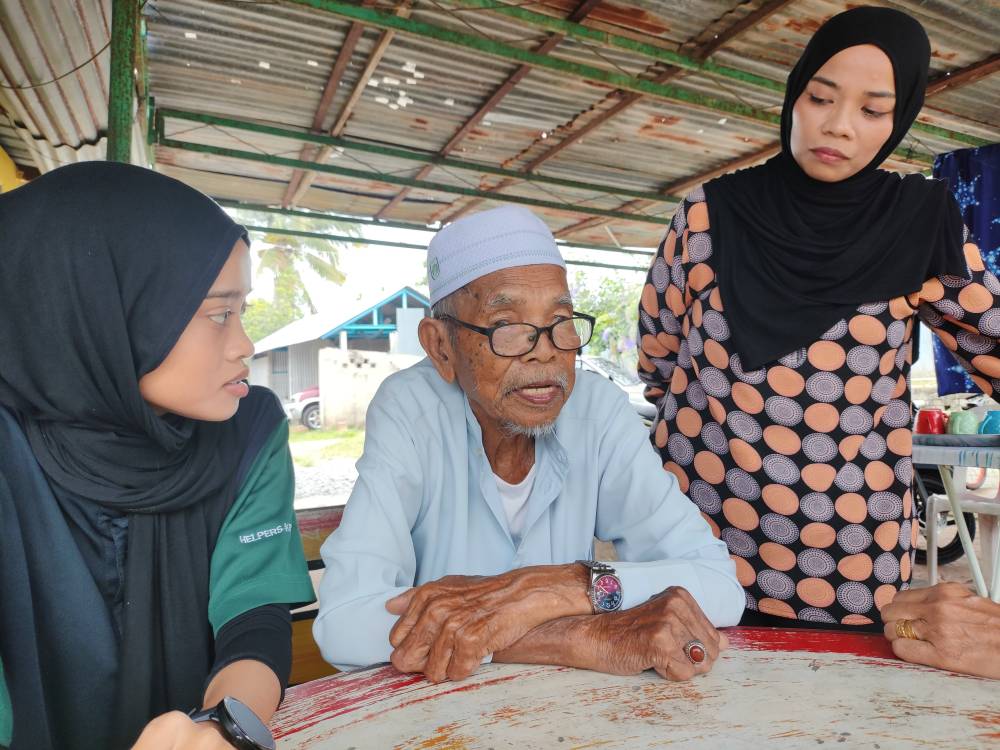Tok Wan Shaari shares grim tales of hiding in forest to evade Japanese soldiers
He vividly recalls the first time he saw a Japanese military plane overhead and the unmistakable sound of gunfire, a result of his village's proximity to the airfield in Kepala Batas.

JITRA - Nonagenarian Shaari Sabu vividly recalled the harrowing hardship of evading Japanese soldiers who sought to conscript him and other teenagers into forced labour.
He described his experience of hiding in the forest during the 1940s in Kampung Kuala Pauh as the 'most costly' of his youth, reflecting on the profound difficulties faced by his family during those trying times.
Affectionately known as Tokwan, Shaari, 96, shared with Bernama the challenges he faced as a teenager during the Japanese occupation of Malaya, a period when young men were at risk of being captured by soldiers for forced labour.
Shaari, then a teenager, recounted how his parents would instruct him every morning after dawn to prepare for hiding in the forest or by the river.
"I didn’t know where the Japanese soldiers took the boys they rounded up. Those who did return spoke of the harsh labour they endured, and some never came back - they died there.
"So, at dawn, my friends and I would get ready to hide in the forest or by the river, as instructed by my parents. My mother packed rice for us, and it was only after nightfall that I would dare return home. But each day, I would have to hide again,” he said during an interview at his residence in Kampung Tanah Merah.
Despite his advanced age, Shaari, who remains in good health and free from chronic illness, has a remarkable clarity of memory regarding events from over 80 years ago.
He vividly recalls the first time he saw a Japanese military plane overhead and the unmistakable sound of gunfire, a result of his village's proximity to the airfield in Kepala Batas.
Shaari described how, in addition to numerous aircraft, Japanese soldiers were frequently seen riding bicycles in large groups as they entered the villages.
"The Japanese were audacious; they brought down British planes and bombed oil tanks.
"Our village is close to the Siamese (Thai) border, which facilitated the Japanese entry. Many Japanese soldiers used the main roads to move through. The British had also built several forts in this area, and you can still see remnants of them today,” he said.
Shaari, who is blessed with five children, 17 grandchildren, and 17 great-grandchildren, also noted that Japanese soldiers would frequently raid the villages, confiscating food such as chickens that residents had raised, as well as coconuts and fruits.
According to him, while hiding in the forest, his mother once recounted a harrowing incident where Japanese soldiers came to their house and forced his father to climb a coconut tree.
The soldiers then entered the house and made themselves comfortable.
"If you couldn’t climb the tree, you’d be threatened with a bayonet.
"Fortunately, my father was skilled at climbing trees and managed to stay safe. Those who weren’t as adept often suffered injuries,” said Shaari hoping that people today remain grateful and vigilant in defending the nation’s independence, as the impacts of colonialism were devastating, affecting not only the country but also its people.
Meanwhile, his daughter, Fatimah Shaari, 69, reflected on how the struggles didn’t end with the declaration of independence on Aug 31, 1957. She noted that progress was slow and hardships persisted for some time.
"Going to school was a challenge; it involved a long journey through muddy roads in estates and rice fields. Shoes had to be wrapped in plastic to keep them clean, and we often went to school barefoot. After washing our feet, we’d put the shoes back on,” she recounted.
"Despite the difficulties, all the village children were eager to attend school. We walked long distances and attended additional evening classes in Mathematics and English. Even walking in the dark didn’t dampen our enthusiasm. The classes were held without electricity, relying on lamps.
Because of her experience, she expressed strong support for this year’s National Day theme, which celebrates the spirit of independence.
She believes that this spirit encourages people to strive for self-improvement, overcome poverty, and work together for the country’s development. - BERNAMA










